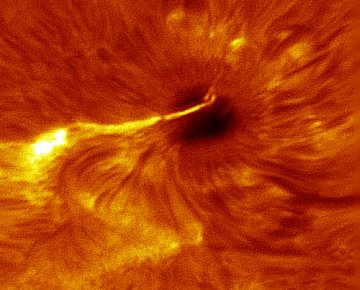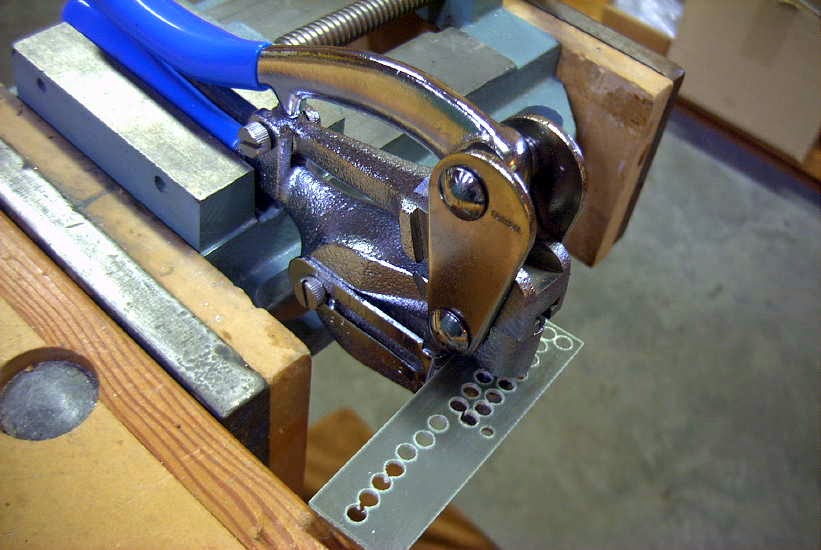 Ham College 47
Ham College 47
Ham College episode 47 is now available for download.
General Amateur Radio Exam part 18. SSB, Speech Processors, ALC and Beverage Antennas.
1:02:27
George Thomas, W5JDX, is co-host of AmateurLogic.TV, an original amateur radio video program hosted by George Thomas (W5JDX), Tommy Martin (N5ZNO), Peter Berrett (VK3PB), and Emile Diodene (KE5QKR). Contact him at [email protected].
 Manhattan Style
Manhattan Style
I haven't yet decided to rebuild the little 630m CW transmitter using Manhattan style or the newer Muppet style being promoted by Chuck, K7QO.
 |
| K7QO Muppet Style |
I recently ran low on the pads used for Manhattan and made another pile of various sizes. For those interested in using this style, it's pretty quick and easy to manufacture a good stock of your own pads using a simple hand punch.
These punches are widely available on e-Bay or possibly at your local hardware outlet or craft store. They come with various sized dies but I have only found myself using two sizes, 5/32 and 3/16. The punches have a small point at the center which I filed off so not to create a dimple in the punched pad.
It's also advisable to scuff sand the bottom of the PCB strip as well as to shine up the copper side with some light steel wool before punching any pads. They will eventually be glued to the circuit's PCB copper surface using a small dab of CA ("super glue") glue and the slight scuffing beforehand will ensure that the pads stay put. My usual technique is to place a tiny dab of glue with a toothpick at the spot where the pad will go. I then pick up the pad using an X-acto knife, spearing the pad's copper side and then pressing it down on the glue spot. CA cures quickly once it is oxygen-starved so pressing down on the pad for a few seconds is usually all that is needed. Any time I have run into trouble it was because I used too much glue....just a small dab is needed.
 |
| VE7SL Lowfer Tx |
For me, one of Manhattan's strongest selling points is that even though final part values may have been fleshed out during a rough build, parts can still easily be changed, added or even removed without a lot of fuss....unlike a PCB....but Muppet does look interesting!
Steve McDonald, VE7SL, is a regular contributor to AmateurRadio.com and writes from British Columbia, Canada. Contact him at [email protected].
 Amateur Radio Weekly – Issue 225
Amateur Radio Weekly – Issue 225
Skywarn Recognition Day is today
During the SKYWARN™ Special Event operators will visit NWS offices and contact other radio operators across the world.
National Weather Service
Amazon AWS Ground Station
Ingest and Process Data from Orbiting Satellites.
Amazon Web Services
Peanut: Talk to DSTAR reflectors via Android
On the Peanut you can talk with Hams around the world via an Android device or network radio.
PA7LIM
VHF Tropo Opening
After 3 hours I’d worked 10 DXCC on 2m.
Adventures in Ham Radio
Designing and Testing a PCB Wideband Spiral Antenna
A Vivaldi antenna is wideband and directional and the design works well for frequencies above 800 MHz, but becomes too physically large to handle for lower frequencies like 400 MHz.
RTL SDR
Restoring A Rusting Old Tower
I’ve discovered that some ‘free’ ham gear is like being given a free dog… you have to be aware of the hidden costs.
VE7SAR
My SOTA Battery Journey
I started out using a small sealed lead acid (SLA) battery. These use well-established battery technology that has stood the test of time.
K0NR
Video
SDR Basics: RTL-SDR + Android
How to Use an RTL-SDR Dongle on an Android Phone.
YouTube
Inside a Sony CRT factory
YouTube
Get Amateur Radio Weekly in your inbox.
Sign-up here
Amateur Radio Weekly is curated by Cale Mooth K4HCK. Sign up free to receive ham radio's most relevant news, projects, technology and events by e-mail each week at http://www.hamweekly.com.
 LHS Episode #261: The Weekender XX
LHS Episode #261: The Weekender XX
 Welcome to Episode #261 of Linux in the Ham Shack. In this, our 20th Weekender edition, we give you information on upcoming amateur radio contests and special event stations, upcoming open-source conferences and events, personal challenges, Linux distributions to try and a whole bunch of hedonism. It's the perfect intro to your next two weekends. Thank you for listening.
Welcome to Episode #261 of Linux in the Ham Shack. In this, our 20th Weekender edition, we give you information on upcoming amateur radio contests and special event stations, upcoming open-source conferences and events, personal challenges, Linux distributions to try and a whole bunch of hedonism. It's the perfect intro to your next two weekends. Thank you for listening.
73 de The LHS Crew
Russ Woodman, K5TUX, co-hosts the Linux in the Ham Shack podcast which is available for download in both MP3 and OGG audio format. Contact him at [email protected].
 Winter SOTA on Devils Head (W0C/FR-051)
Winter SOTA on Devils Head (W0C/FR-051)
One of our favorite summit hikes along the front range of Colorado is Devils Head lookout tower (W0C/FR-051). This hike is about 1.5 miles one way with 900 feet of vertical gain. See my summer trip report from July 2012 for more information on the hike. This year we activated the summit in winter.

One problem with this trail is that it has become extremely popular in the summer months. The actual summit and lookout tower is not very big and can get very crowded. This is tolerable for hiking but can make a Summits On The Air (SOTA) activation difficult. It certainly is not a “get away from it all” experience.

Recently, Brad/WA6MM pointed out that the summit is still accessible now (in late November) and the crowds have all disappeared. Note that the trailhead will be difficult to access starting December 1st (see the Devils Head forest service page).

We took highway 67 out of Sedalia, then south on Rampart Range Road (FS 300) to the well-marked side road that goes to the trailhead . The forest service roads had 6 to 8 inches of snow on them but we were able to drive our 4WD pickup truck to the trailhead without any problem. The trail was also snow covered but walking in high-top hiking boots worked just fine. We had our microspikes along in case of ice but did not use them.

As you can see from the photos, it was a bright sunny day…wonderful day to be out hiking in the mountains. Temperature was about 25 degrees F but very light wind.

We met a total of four other parties on the trail, so not very busy.
Once on top, we started calling on 146.52 MHz with many stations responding. That summit has good line-of-sight to Denver and the other front range cities. As things quieted down on 2 meters, I switched to 446.0 MHz and worked a bunch of stations there, too. We were using the small TYT 2m/70cm mobile transceiver (which I recently repaired) and yagi antennas for 2m and 70cm. I also had my 23cm HT and Comet yagi with me and managed to work Paul/W0RW on 1294.5 MHz, about 33 miles (53 km) away in Colorado Springs.
Here is my log from the activation:
 Joyce worked a subset of these stations. In particular, she was very happy to work three women. She has been referring to these contacts as “F2F” for “female to female.” On this activation, her F2F QSOs were: Annette/KA0JKZ, Sharon/KC0PBR and Barbara/W0BJE. Way to go, ladies!
Joyce worked a subset of these stations. In particular, she was very happy to work three women. She has been referring to these contacts as “F2F” for “female to female.” On this activation, her F2F QSOs were: Annette/KA0JKZ, Sharon/KC0PBR and Barbara/W0BJE. Way to go, ladies!

We’ve made a note to do this summit again next year, after the crowds are gone. It is a really nice early winter hike. Thanks to everyone that worked us on the summit.
73 Bob K0NR
The post Winter SOTA on Devils Head (W0C/FR-051) appeared first on The KØNR Radio Site.
Bob Witte, KØNR, is a regular contributor to AmateurRadio.com and writes from Colorado, USA. Contact him at [email protected].
 LHS Episode #260: The Sun’s Massive Ejection
LHS Episode #260: The Sun’s Massive Ejection
 Welcome to Episode 260 of Linux in the Ham Shack. We're so glad you could join us. In this episode, the hosts talk about the results of JOTA 2018, FCC Part 15 rules, the sun and its atmosphere, new satellites, cryptocurrency vulnerabilities, Fedora, SDR with the Raspberry Pi and much more. Thank you for listening!
Welcome to Episode 260 of Linux in the Ham Shack. We're so glad you could join us. In this episode, the hosts talk about the results of JOTA 2018, FCC Part 15 rules, the sun and its atmosphere, new satellites, cryptocurrency vulnerabilities, Fedora, SDR with the Raspberry Pi and much more. Thank you for listening!
73 de The LHS Crew
Russ Woodman, K5TUX, co-hosts the Linux in the Ham Shack podcast which is available for download in both MP3 and OGG audio format. Contact him at [email protected].
 ICQ Podcast Episode 281 – National Radio Centre
ICQ Podcast Episode 281 – National Radio Centre
In this episode, Martin M1MRB is joined by Chris Howard M0TCH , Martin Rothwell M0SGL, Dan Romanchik KB6NU, Ed Durrant DD5LP and Frank Howell K4FMH to discuss the latest Amateur / Ham Radio news. Colin M6BOY rounds up the news in brief and this episode’s feature is National Radio Centre.
ICQ AMATEUR/HAM RADIO PODCAST DONORS
We would like to thank Bruce Hymon along with our monthly and annual subscription donors for keeping the podcast advert free. To donate, please visit - http://www.icqpodcast.com/donate
- ARRL Director and Vice Director Election Results Announced
- Green Keys Night
- URC Calls for Basic French License
- Australian Labor Party Commits $2 million to Resurrect ABC Shortwave Radio (if elected)
- Es’hail-2 Geostationary Satellite Launched
- Santa's Radio Club Special Event - OH9S
- Extending and Enabling New Licence Exemptions for 57-71 GHz
- CT1BAT New Vice-President of EURAO
Colin Butler, M6BOY, is the host of the ICQ Podcast, a weekly radio show about Amateur Radio. Contact him at [email protected].


.jpg)














